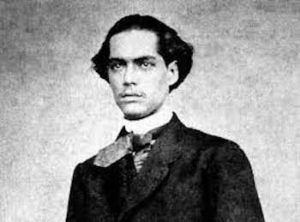
Antônio de Castro Alves
*On this date in 1847, Antônio Frederico de Castro Alves was born. He was an Afro Brazilian poet and playwright.
Castro Alves was born in the town of Curralinho, in the Brazilian state of Bahia, to Antônio José Alves, a doctor, and Clélia Brasília da Silva Castro, one of the daughters of José Antônio da Silva Castro, a prominent soldier in the 1821–23 Siege of Salvador. In 1853, he was sent to study in the Colégio Sebrão, run by Abílio César Borges, the Baron of Macaúbas. There, he would meet and befriend Ruy Barbosa.
In 1862, he moved to Recife to study at the Faculdade de Direito do Recife and was rejected twice. He only could join the college in 1864, meeting Tobias Barreto and José Bonifácio. They would heavily influence Alves' writing style and the reverse. His father died in 1866, and shortly after, he met Portuguese actress Eugênia Câmara and started dating her. In 1867, Alves returned to Bahia alongside Câmara, and there he wrote his drama Gonzaga, ou A Revolução de Minas, based on the life of Brazilian Neoclassic poet Tomás António Gonzaga and his participation in the failed 1789 Minas Conspiracy. The following year, he and Câmara would go to São Paulo, where Alves entered the Faculdade de Direito da Universidad de São Paulo and once more would meet Ruy Barbosa. In there, he also befriended Pedro Luís Pereira de Sousa and wrote a poem named "Deusa incruenta," based on Sousa's work "Terribilis Dea."
His play Gonzaga would be performed at the end of 1868, and it was well-received by critics and the public. Soon after, his romantic engagement with Eugênia Câmara terminated. During a hunting trip the same year, Alves received an accidental shotgun shot in his left foot that had to be amputated due to the menace of gangrene. However, a prosthesis was made for him, and thus, he could walk again with an assistive cane.
He would spend 1870 in his home state of Bahia, trying to recover from tuberculosis he got while in São Paulo. Also, in 1870, Alves published the poetry book Espumas Flutuantes – the only work he would publish during his lifetime. All his other works would receive a posthumous publication. His attempts to mitigate tuberculosis were in vain. Alves, one of the most famous poets of the "Condorism" literary movement, won the epithet of "O Poeta dos Escravos" ("The Poet of the Slaves").
In 1900, his hometown was renamed "Castro Alves" in his honor, and he was the patron of the 7th chair of the Brazilian Academy of Letters. Antônio de Castro, famous for his abolitionist and republican poems, died in Salvador on July 6, 1871, at 24.